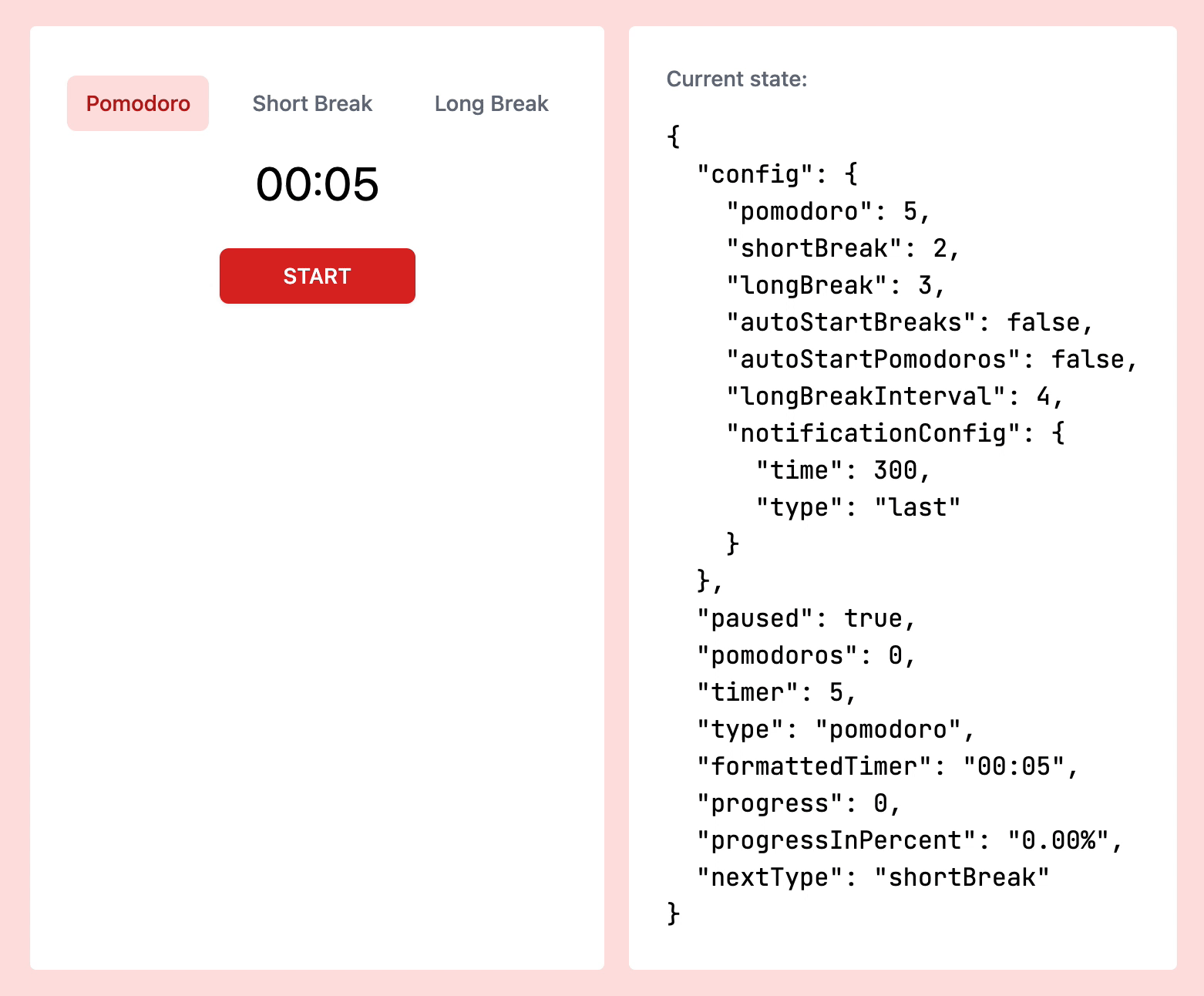use-pomodoro v1.1.4

use-pomodoro 🍅
Use pomodoro logic wrapped in a react hook / no extra dependencies
What is pomodoro technique?
The Pomodoro Technique is a time management method developed by Francesco Cirillo in the late 1980s. It uses a timer to break work into intervals, typically 25 minutes in length, separated by short breaks. Each interval is known as a pomodoro, from the Italian word for tomato, after the tomato-shaped kitchen timer Cirillo used as a university student.
The technique has been widely popularized by apps and websites providing timers and instructions. Closely related to concepts such as timeboxing and iterative and incremental development used in software design, the method has been adopted in pair programming contexts.
Install
npm install --save use-pomodoroBasic Usage
This is a basic usage of usePomodoro hook and it's abilities.
import { usePomodoro } from "use-pomodoro";
const Example = () => {
const {
state,
dispatch,
start,
stop,
reset,
goPomodoro,
goShortBreak,
goLongBreak,
changeConfig,
formattedTimer,
} = usePomodoro();
return <div>{formattedTime}</div>; // should render 25:00
};Context usage
If you need pomodoro timer sync within multiple components, then you can use Context API prepared for that.
import { PomodoroProvider } from "use-pomodoro";
// Example.tsx
const Example = () => {
return (
<PomodoroProvider>
<Navbar />
<App />
<Footer />
</PomodoroProvider>
)
};
// Navbar.tsx
import { usePomodoroContext } from "use-pomodoro";
const Navbar = () => {
const { state, start, ...rest } = usePomodoroContext();
}
// Footer.tsx
import { usePomodoroContext } from "use-pomodoro";
const Footer = () => {
const { formattedTimer, start, stop ...rest } = usePomodoroContext();
}Return API of usePomodoro and usePomodoroContext hooks
state: PomodoroState: current state of the pomodorodispatch: (action: PomodoroAction) => void: dispatch action to change the statestart: () => void: start the timerstop: () => void: stop the timerreset: () => void: reset the timergoPomodoro: () => void: go to pomodoro stategoShortBreak: () => void: go to short break stategoLongBreak: () => void: go to long break statechangeConfig: (config: Partial<PomodoroConfig>) => void: change the configformattedTimer: string: formatted time (e.g.25:00)
Types
// every - repeating time of notification
// last - send one notification x seconds before timer ends
type NotificationType = "last" | "every";
type NotificationConfig = {
type: NotificationType; // default: "last"
time: number; // time in seconds, default: 5 minutes
};
type PomodoroConfig = {
pomodoro: number; // pomodoro time in seconds (default: 25 minutes)
shortBreak: number; // short break time in seconds (default: 5 minutes)
longBreak: number; // long break time in seconds (default: 15 minutes)
autoStartBreaks: boolean; // start short and long breaks automatically after work time (default: false)
autoStartPomodoros: boolean; // start pomodoros automatically after breaks (default: false)
longBreakInterval: number; // long break interval in pomodoros (default: 4)
notificationConfig: NotificationConfig; // notification config
};
// current timer type (pomodoro, short break, long break)
type PomodoroType = "pomodoro" | "shortBreak" | "longBreak";
// pomodoro state (usage and configuration values)
type PomodoroState = {
type: PomodoroType; // current timer type (default: "pomodoro")
timer: number; // current timer value (default: 25 minutes)
paused: boolean; // timer is paused (default: true)
config: PomodoroConfig; // pomodoro configuration
};Development
Local development is broken into two parts (ideally using two tabs).
First, run rollup to watch your src/ module and automatically recompile it into dist/ whenever you make changes.
npm start # runs rollup with watch flagThe second part will be running the example/ create-react-app that's linked to the local version of your module.
# (in another tab)
cd example
npm start # runs create-react-app dev serverNow, anytime you make a change to your library in src/ or to the example app's example/src, create-react-app will live-reload your local dev server so you can iterate on your component in real-time.
TODO
- create example app
- add progress value for current timer
- add toggle timer function
- add pomodoros counter
- add skip forward to next timer type
- add nextType value
- write down list of features
- add tests
- export types
License
MIT © kacgrzes
This hook is created using create-react-hook.

